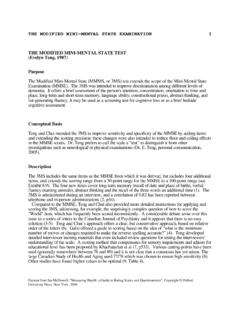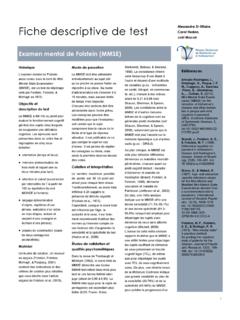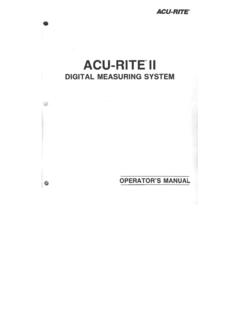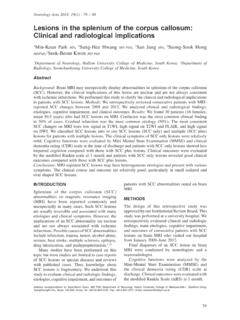Transcription of The Mini-Mental State Examination: Strengths and ...
1 The Mini-Mental State examination : Strengths and Weaknesses of a Clinical Instrument Over the past 20 years, the Mini-Mental State examination has proven to be a useful and reliable tool especially for initial contact with a patient having intellectual deficits or experiencing deterioration. by Martine Simard, PhD. The Mini-Mental State examination written commands, write a sentence (MMSE) is a clinical diagnostic tool spontaneously and copy two inter- that is used both for research and in secting pentagons. The maximum neurologic and psychiatric clinical MMSE Score is A good sensi- practice. The MMSE is also one of tivity and specificity on the MMSE. the most frequently used screening is demonstrated by Folstein et al;. and outcome measures in cognition- the scores on the MMSE differed enhancing drug trials for Alzheimer's significantly in 69 patients with disease (AD).1 It is, therefore, impor- dementia syndromes, affective tant be knowledegeable about the disorder (major depressive disorder).
2 Characteristics, Strengths and weak- and affective disorder with cognitive nesses of this cognitive evaluation for They also found good the detection and follow-up concurrent validity when compared of dementia. to the Verbal and Performance Intellectual Quotient (VIQ and PIQ). Instrument Description of the Wechsler Adult Intelligence The MMSE is a short and easy-to- Scale (WAIS), as well as an excel- Martine Simard is a Research administer test of a person's intellec- lent test-retest and inter-rater relia- Fellow, Department of Psychiatry and Kunin-Lunenfeld Applied tual capacities. The MMSE is divided bility. 2 Other studies have con- Research Unit, Baycrest Centre for into two sections. The first section firmed the reliability of the MMSE. Geriatric Care; Division of requires only oral responses; it covers and its capacity to measure cogni- Geriatric Psychiatry, Department of temporal and spatial orientation, tive improvement following treat- Psychiatry, University of Toronto, memory (registration, repetition and ment of Toronto, Ontario.)
3 Recall of three objects) and attention (counting backwards in units of The MMSE and seven, starting with 100, or spelling the Evaluation of the word world backwards). The Cognitive Impairment second section tests language; and The cut-off scores of 24-25 provides visuospatial functions; it requires the a reliable diagnosis of dementia subject to name simple objects with high sensitivity, specificity and (watch and pencil), follow verbal and diagnostic Norms with per- 10 The Canadian Alzheimer Disease Review December 1998. centiles and z scores, comparing the items Recall and Copy a Design to improve the usefulness of the performance of an individual to an of the MMSE are the most difficult MMSE. 11 Four tests have been alternate score from the same items to perform added to the original scale: disease group, are now available for 1. Personal information: place and AD patients, vascular dementia and Norms for the MMSE date of birth;. non-demented patients complaining The MMSE has been found to be sen- 2.
4 Verbal fluency: what animals have of memory It is, howev- sitive to age and education ,4 four legs?;. er, impossible to differentiate the Population-based norms for age and 3. Abstraction or conceptual think- type of dementia by simply using education level have therefore been ing: similarities, for example, In cut-off scores on the ,5 This developed. In 1993, Crum et al what ways are an arm and a leg instrument can, nevertheless, effec- assessed the MMSE scores of 18,056 alike? ;. tively measure the severity of adults, ranging from age 18 to greater 4. Long-term recall: second recall of dementia and cognitive decline over than 85 years old, with no education the three words, at the end of the a period of one to two years, which to having a Bachelor's degree or test, following the copy of the is consistent with physician mea- higher education. The researchers three-stage command. sures of transitional mental and reported MMSE scores as mean, physical health, self-care and inter- median and percentile distributions Some minor modifications have also active abilities of ,6,7 A specific for age and education level.
5 Been made: pattern of deteriorating mental func- They found an inverse relationship 1. Attention: counting forward and tions can also be described using the between MMSE scores and age, backward instead of serial calcu- ,8 A study conducted by ranging from a median of 29 for lations;. Ashford et al, studying 86 patients those 18 to 24 years of age, to 25 for 2. First recall: three words instead of meeting DSM-III criteria for prima- individuals over the age of 80. The three objects and introduction of ry degenerative dementia (average median MMSE score has been 29 for category cues and three choices of age of 74 8 and an average educa- individuals with at least nine years answer;. tion of 11 3), and using logistic of schooling, 26 for those with five 3. Temporal orientation: acceptation regression analyses, describe the to eight years of schooling and 22 of the closeness of the response as progressive loss of some items of for those with none to four years of opposed to the original the In the mild stage of correct/incorrect scoring.
6 Dementia (MMSE score above 20), 4. Spatial orientation: choice of items with the highest severity of Comparing the MMSE answer for the hospital item;. impairment are the ones related to With Other Short Tests 5. Naming: name body parts instead recent memory and attention func- Comparisons of the MMSE with the of watch and pencil ;. tions: recall of three objects, recall Mattis Dementia Rating Scale 6. Repetition: addition of one sen- of the date and the serial seven cal- (MDRS) and the Information- tence: I would like to go culations. In the moderate stage of Memory-Concentration (IMC) test home/out ;. dementia (MMSE score greater than of the Blessed scale have shown that 7. Writing: a sentence is provided to 10 and less than 20), impaired items these three scales are intercorrelated the subject instead of asking for a are related to long term memory and, consequently interchange- spontaneous sentence;. functions like orientation for time ,10 All tests have reached a 8.
7 Copy of the two intersecting and place. In the severe stage of good diagnostic value for probable pentagons: a time limit of one dementia (MMSE score of 10 or AD of to , but the MMSE minute and a 0-10 graded scoring less), lost items include repetition of is the most While the three are now given instead of the 0-1. words, naming of simple objects tests have shown sensitivity to scoring of the MMSE. and following commands. Naming change (annual rate of change), the One significant difference between objects, writing and reading are lost MDRS illustrates the greatest sensi- the 3MS and the MMSE is that the even later in AD than the repetition tivity with increasing dementia 3MS provides a range of scores on and command Some items severity for AD10, but not for vascu- many items for which a correct/incor- remain difficult to achieve through- lar The Modified mini - rect dichotomy is given in the MMSE. out the disease process. For early mental State (3MS) examination The range of scores has broadened and long standing dementia, the two has been devised by Teng and Chui from 0-30 to 0-100 with the The Canadian Alzheimer Disease Review December 1998 11.
8 Data gathered on 1600 subjects from measures of memory functions Conclusion the Canadian Study of Health and included in the MMSE are, however, Although the MMSE presents some Aging indicate that the 3MS has a very limited; there are no cueing or weaknesses, it still remains a useful better validity than the MMSE in iden- recognition paradigms, no visuals, and reliable tool especially for first tifying dementia and all levels of cog- personal or working memory mea- contact with a patient having intellec- nitive impairment. The superiority of sures and the assessment of attention tual deficits or deterioration. It rapid- the 3MS is due more to its extended is done only through serial calcula- ly provides data that illustrates the scoring system than to its additional tions or spelling the word WORLD severity of the cognitive impairment. backwards. The MMSE is a universally known In addition, the MMSE does not instrument that provides information Weaknesses have any tasks to assess executive on the mental State of a patient; the of the MMSE functions like tests of the capacity to information is easy to communicate Criticism of the MMSE can now be abstract, or to judge a social situation.
9 And interpret for professionals. Due to addressed after being utilized for the These intellectual abilities have been the weaknesses mentioned previous- past 20 years in a number of neuro- found to be altered early in the AD ly, however, using the MMSE along logic, psychiatric and pharmacologic process. In addition to possible with other recommended cognitive studies. When applied to the detec- ceiling effects in mild AD, the measures to confirm a diagnosis of tion of mild AD, for example, in the MMSE may also present floor dementia and to provide follow-up screening phase of a cognition effects in advanced stages of AD, with data, particularly in cognition- enhancing drug trial, the MMSE may the difficulty to assess memory, lan- enhancing drug trials for AD, lack sensitivity to early signs of guage and perceptual problems in is recommended. dementia and present ceiling severely impaired patients. effects , resulting in false-negative Another problem with the MMSE.
10 ,3 It is now acknowledged is that it can cause interpretation that memory is composed of different problems particularly in cognition- and, sometimes, overlapping sys- enhancing drug trials where repeti- This work was supported by the tems. Some of these systems are the tive assessments are often done in Alzheimer Society of Canada (post- first and most severely impaired short time intervals. Repetitive test- doctoral fellowship) and the Kunin- aspects of cognition, even in the min- ing with the same instrument may Lunenfeld Applied Research Unit, imal stage of AD, while other memo- produce practice effects, especially Baycrest Centre for Geriatric Care, ry systems are relatively The in mild Toronto, Ontario. References 5. Meiran N, Stuss DT, Guzman A: 9. Crum RM, Anthony JC, Bassett SS et 1. Simard M, van Reekum R: Memory Diagnosis of dementia-methods for al: Population-based norms for the assessment in studies of cognitive interpretation of sores of 5 neuropsycho- Mini-Mental State examination by age enhancing drugs for Alzheimer's dis- logical tests.




